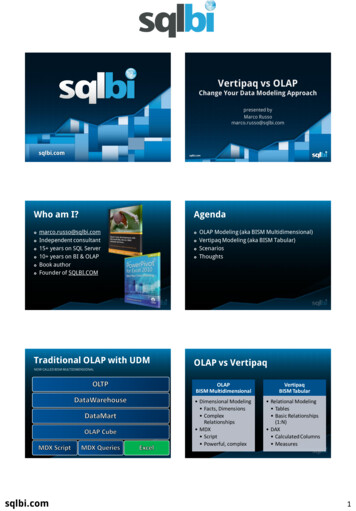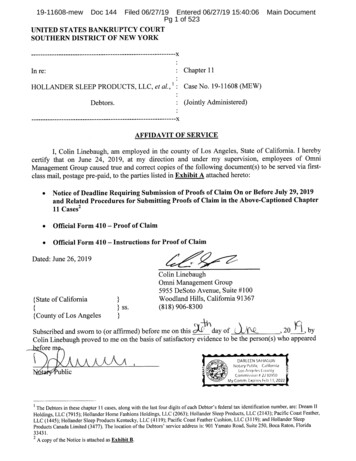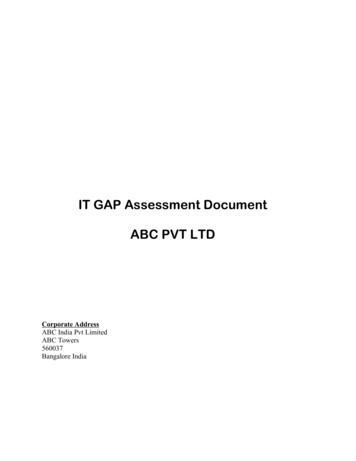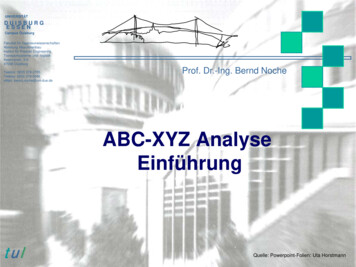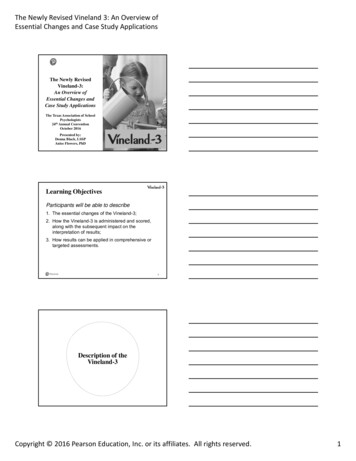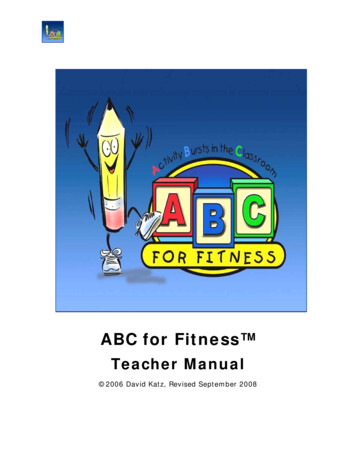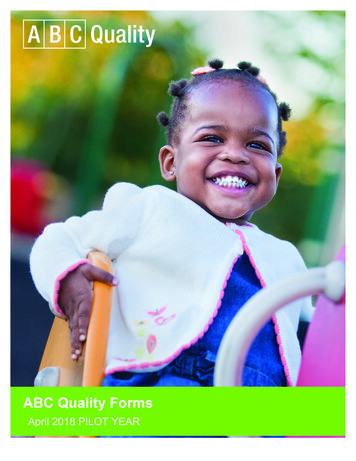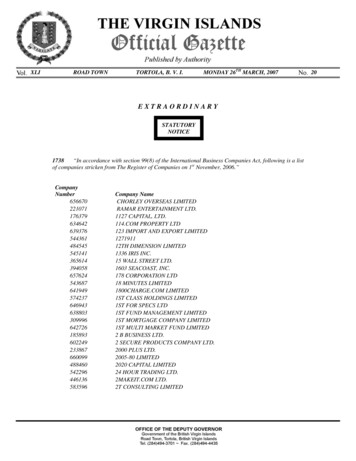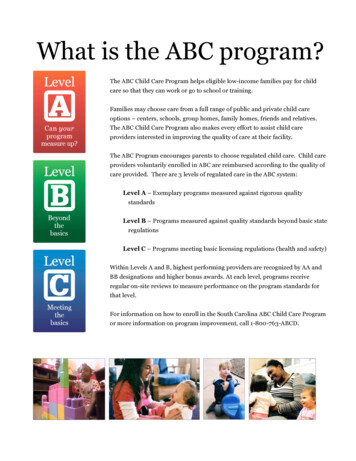
Transcription
What is the ABC program?The ABC Child Care Program helps eligible low-income families pay for childcare so that they can work or go to school or training.Families may choose care from a full range of public and private child careoptions – centers, schools, group homes, family homes, friends and relatives.The ABC Child Care Program also makes every effort to assist child careproviders interested in improving the quality of care at their facility.The ABC Program encourages parents to choose regulated child care. Child careproviders voluntarily enrolled in ABC are reimbursed according to the quality ofcare provided. There are 3 levels of regulated care in the ABC system:Level A – Exemplary programs measured against rigorous qualitystandardsLevel B – Programs measured against quality standards beyond basic stateregulationsLevel C – Programs meeting basic licensing regulations (health and safety)Within Levels A and B, highest performing providers are recognized by AA andBB designations and higher bonus awards. At each level, programs receiveregular on-site reviews to measure performance on the program standards forthat level.For information on how to enroll in the South Carolina ABC Child Care Programor more information on program improvement, call 1-800-763-ABCD.
South Carolina Department of Social ServicesABC CHILD CARE QUALITY IMPROVEMENT SYSTEMEnrollment FormB ON-SITE ASSESSMENTAPPLICATIONABC LEVELThe purpose of this form is to gather information to determine if prerequisites are met for an ABC LevelB on-site assessment. To receive a Level B program assessment, a child care center must be able to meetthe Level B mandatory standards which are beyond the state’s licensing requirements.This application must be completed in full, signed by the owner/sponsor or designee, and returned by mailto Elaine Justice Boyd, Department of Social Services, ABC Child Care Services, P.O. Box 1520,Columbia, SC 29202-1520 to be considered for a Level B assessment visit. Incomplete applications maybe returned with the additional information needed highlighted.NOTE: Through this application, child care programs must be able to demonstrate their ability to meetthe criteria outlined in the ABC Level B Center-Based Standards. Please be mindful that completion ofthis application does not guarantee enrollment into the ABC Child Care Quality Improvement System.Please provide the following:CENTER INFORMATIONFEIN () OR Social Security ()Provider/Agency Name:Facility Name(if different from Provider Name):Facility County Name: Facility Phone #: Director'sName:Alternate Contact Person/Name: Relationship: Phone #:OwnerName: OwnerNo.Facility Address:Facility Number & Street, or Route No.City:State:Payment Address:Zip Code:Fax #(Number & Street, P.O. Box or Route #)City: State: Zip Code: Payment Phone #:
Hours of Operation:Days of Operation:AM/PM to AM/PM MTWTHFSASU ) Regulatory Requirement ) Provider Category ) Ownership Status:(check only one)(check as many as applies)(check one from each of the 3categories nority OwnedAccredited CenterApprovalPrivate-for-profitNon-Minority OwnedGroup Child CareHomeRegistrationPrivate-non-profitFamily Child CareHomeExemption LetterPublicly SponsoredSole ProprietorExemptionMilitaryHead StartPartnershipSchool DistrictCorporationLess than 4 hours/dayOther ) Provider Type(check only one)Regulatory Information:Number:Capacity:If applicable, No. of infantsunder 30 months of age:Summer CampState EmployeeDate of Expiration:Non-State EmployeeLegislatorCare Types Provided: (Check all that apply)0-2 Full3-5 Full6-12 Full0-2 Half3-5 Half6-12 HalfAre you currently an ABC Provider? (please circle) YES / NOPlease list an e-mail address or website address (if applicable)EMERGENCY COVERAGE:Staff Coverage. Please indicate arrangements for handling staff-child ratios when a caregiver isabsent or when there is an emergency in your child care facility:
Number of children and adults in each classroom. A classroom is defined as an identified group ofchildren assigned to a caregiver or caregivers. Below, for each classroom/group, please indicate the agesof the children, the number of children, and the number of salaried adults in the classroom/group at alltimes.Identify classroom/group Age range of # of children in the # of Salaried Adults inby # or name belowchildren in the classroom/groupthe classroom/groupclassroom/groupSouth Carolina Department of Social Services ABC Quality Improvement System
List of Staff- for Licensed and Approved FacilitiesTo be completed by Child Care Facility Owner, Director, or DesigneeName of Facility:County:Physical Address: (Street, City, State, E: ALL STAFF MUST BE AT LEAST 18 YEARS OF AGEYearsinchildcareJob Title withage group – i.e.LD or ASFulltime orPartTimeCurrentSignedDisciplinePolicyDate ofemploymentCurrentPediatricCPR and FirstAidDate ofBirthCCCCDOfficialTranscriptSocial SecurityNumberDegreesand/orCertificatesNameFirst and LastValid HighSchoolDiplomaDocuments to send
Please make sure to submit copies of requested documents and ensure that theapplication is signed below.(See Enrollment Visit Required Items Checklist)PLEASE RETURN COMPLETED APPLICATION AND COPIES OFDOCUMENTS TO:ABC Child Care ProgramAttn: Elaine Justice BoydDepartment of Social ServicesP. O. Box 1520Columbia, South Carolina 29202-1520Owner/Director/Designee: Please sign below to indicate that you have reviewed the information provided in thisform and all documents that have been attached and that you attest to their accuracy.Signature of Owner/Director/Designee:Title: Date:Printed name of Owner/Director/Designee:Name and Title of Person Completing Form:
Required Documentation for Enrollment in ABCLevel B - Licensed CentersTo enroll in Level B of the ABC Child Care Quality Improvement System, we must verify that your program meetsPart I of the Mandatory Standards. Please submit the following documents, with your application, so that we mayverify compliance with these Level B Part I Mandatory Standards prior to scheduling an on-site review. Submit a copy of your REGULAR license or registration from the SC Department of Social Services.Programs cannot enroll in the ABC Quality Improvement System with a provisional license. Complete the attached staff information chart and please include COPIES of the following documents forALL staff: Valid High School Diploma/GED(For the definition of a valid high school diploma see page 12 of the ABC RequiredMandatory Standards Part I.)Certificates/Degrees of higher education for all Lead Teachers and Director(At a minimum, all lead teaching staff must have ECD 101and directors must have anEarly Childhood Certificate. For additional information on meeting the Level Beducational requirements, refer to the ABC Required Mandatory Standards Part I,Standard III; Staff Qualifications and Development, pp. 4-7.)Official Training Transcript from CCCCD (The Center for Child Care CareerDevelopment)Pediatric CPR and First Aid CertificationSigned Discipline Policy (All staff are required to sign a discipline policy annually.) Submit a copy of your program handbook and/or newsletter, if applicable. Submit a copy of the Discipline Policy given to parents in your program. (Parents are required to sign adiscipline policy annually. Parents’ signatures will be verified during your on-site review.) Submit a copy of your program’s Nutrition Policy that is provided to all staff and parents in your program.(Evidence that staff and parents have been informed of this policy will be requested at your on-site review.) Submit a copy of your program’s Physical Activity Policy that is provided to all staff and parents in yourprogram. (Evidence that staff and parents have been informed of this policy will be requested at your onsite review.) Submit a copy of your current rates. Submit a completed and signed W-9 Form. (www.irs.gov/formspubs) Submit a copy of the IRS Form SS4 or letter 147-C, assigning your Federal ID number. (Please call1.800.829.0115 or 1.800.829.4933 to request a copy of your IRS Form SS4 or letter 147-C, if you cannotlocate your original document.) Submit a copy of your current menu (Include at least two weeks’ worth of menus.)
Provider InformationCenter-Based Standards - ABC Child CareSouth Carolina’s Quality Improvement SystemName of ProviderFEIN/SSN#Name of Facility (if different)AddressMailing AddressE-Mail Address FAX #Phone#Contact person/owner0-2 Meets Part I Required Standards I through V Yes No0-2 standards: ReviewerReview dateEnrolled Yes No Score3-5 Meets Part I Required Standards I through V Yes No3-5 standards: ReviewerReview dateEnrolled Yes No Score6-12 Meets Part I Required Standards I through V Yes No6-12 standards: ReviewerReview dateEnrolled Yes No ScoreType of VisitEnrollment visitUnannounced monitoring visitRevisitProvider CategoryPrivate, non profitPublicly SponsoredPrivate, for profitFaith-based Sponsored/licensedHead Start OrganizationMilitary ProgramOther (define)School District Copyright 2012 South Carolina Department of Social Services – ABC Child Care,Child Care Services – PO Box 1520, Columbia, SC 29202-1520 - www.abcqualitycare.org10/1/12 - 1Page 1 of5
SC’s Quality Improvement SystemIntroduction to ABC Child Care Program StandardsThe following standards constitute the criteria for Level B child care and development services inthe ABC Quality Improvement System. Level B providers are assessed based on their compliance tothe standards for the age group(s) to be served. Providers may elect to enroll to serve 0-2 year olds,3-5 year olds, and/or 6-12 year olds.The standards for ABC Child Care exceed the state licensing and regulatory requirements for ChildCare Centers in South Carolina. All providers classified as Level B enrolled in ABC Child Care mustfirst meet regulatory requirements governing their operation according to statute and SCDepartment of Social Services child care licensing regulations and must maintain a history ofcompliance with those regulations.The ABC Level B standards have been divided into progressive parts. Part I consists of Standards IV which are required for all Level B enrolled providers. Compliance is based on documentationfrom the service provider as well as on-site observation and review by the South CarolinaDepartment of Social Services (SCDSS) staff. To enroll at Level B, the potential provider must meetor be able to meet all Standards I-V prior to participating in an on-site observation of the remainingstandards.Upon determination of compliance to Part I. Standards I-V, an observation of the facility will beconducted with the potential service provider. On the date of the review, Part II, III and IV of thestandards that are applicable for age groups to enroll or continue enrollment will be completed bythe reviewer.In order to become enrolled and continue enrollment at Level B, a provider must reach a minimum10/1/12 - 1Page 2 of5
80% compliance level overall on Standards VI, VII, VIII, and IX for each age group served asmeasured by the SCDSS reviewer. To achieve Level B , a provider must comply with Part I,Standards I-V and reach a minimum 90% compliance overall on Standards VI, VII, VIII, and IX foreach age group served as measured by the SCDSS reviewer.To determine compliance for Standard VI:The reviewer will conduct an analysis of the potential provider's staff-child ratio and group size todetermine compliance with ABC Child Care staff-child ratios and group size which are morestringent than regulatory requirements. All providers who elect to participate in the ABC Child CareProgram must meet the staff-child ratios as defined by the South Carolina Child Care Regulations(Section 114-504: Supervision) as follows:AgeMaximum RatiosBirth – 1 year1-2 years2-3 years3-4 yearsAge1:51:61:81:12Maximum Ratios4-5 years5-6 years6-12 years1:171:201:23Groups meeting ABC ratios and group size will be awarded points for compliance. ABC staff-childratios and group size are as follows:AgeMaximum RatiosUnder 2 years2-3 years3-4 years4-5 years1:51:71:111:13Group Size10142226AgeMaximum Ratios5-6 years6-9 years9-12 years1:151:181:20GroupSize303640The reviewer will observe in at least one classroom for each age for 30 minutes to one hour andprovide assessments for the following standards: Standard VII - Staff-Child Interactions is based on the reviewer's observation of thecaregivers in each room or group and measures staff members’ availability andresponsiveness to children, positive verbal interactions with children, opportunities forchildren to be responsible and have choices, and positive guidance techniques.10/1/12 - 1Page 3 of5
Standard VIII - Activities is based on the reviewer's rating of the center's activities byroom or group and measures the balance, choice and variety of activities within a planneddaily schedule that allows for individual differences and is developmentally appropriate. Standard IX - Physical Environment A. (Indoor Environment) is based on thereviewer's assessment of each room and measures the quantity, variety and durability ofage-appropriate materials and their accessibility to children. Standard IX - Physical Environment, B. (Outdoor Environment) is based on thereviewer’s assessment of the center’s outdoor playground area designated for children’s use.The reviewer’s assessment will measure the sufficiency, safety, and age-appropriateness ofthe outdoor playground area for the age group observed.Each numbered item under Standards VII, VIII, and IX carries a weighted score if met. If the itemis not met, it receives a score of 0. The total possible points for a center will be calculated on thenumber of caregivers and number of rooms/groups observed for the applicable age group. Thenumber of points the center receives will then be divided by the total possible points for the agegroup observed to determine the percent of compliance for the applicable age group. See Parts II,III and IV for specific scoring criteria of each age group.The requirement of 80% compliance for each age group (0-2, 3-5, and 6-12) allows for an individualcenter to accommodate for program weakness in one area by possible strengths in another area.The assessment system provides an evaluation of the program by staff, room, and overall centercompliance to the standards. The review report includes summaries of each room observed andeach age group. Thus, a program failing to meet 80% compliance can target areas of noncompliance for upgrading.The completed assessment of the program's performance on the standards is returned to theprovider with notification of successful enrollment, continued enrollment, or notification of failureto meet enrollment standards. Provider business agreements are made for a period of three years.10/1/12 - 1Page 4 of5
Non-correction of deficiencies or repeated deficiencies can result in provider termination from ABCChild Care or non-renewal of the business agreement.10/1/12 - 1Page 5 of5
ABC CHILD CARESC’s QUALITY IMPROVEMENT SYSTEMREQUIRED PROGRAM STANDARDSCENTER-BASEDPART IStandard I. Regulatory RequirementsThe program maintains compliance to state regulations pertaining to licensure and history of compliance.REGULATORY STATUSA.ABC Level B programs shall be regulated as required by the appropriate state/federal licensing and regulatory lawsEvidence: Verification of regulatory status to include: current regular license/approval from SC DSS Child Care Regulatory Services forDSS licensed/approved centers; dated regulatory report from other regulatory bodies as applicable; dated proof of DSS exemptionverification.SCDSS LicenseSCDSS Approval#Date of ExpirationLicensed Capacity Infant/Toddler capacity 24/30 monthsDepartment of Defense Certificate to OperateMEETS /VALIDATED ON-SITEYESDSS Exemption VerificationNODATEHISTORY OF COMPLIANCEB.ABC Level B programs must maintain a history of compliance. History of compliance is defined as having no frequent ormultiple deficiencies or a significant event posing substantial threat to the health or safety of the children that involve supervision,compliance with ratios, or health and safety violations.Evidence: Documented agency review of program’s regulatory history for evidence of frequent deficiencies (3 or more within 6months); multiple (3 or more different) deficiencies within a 12 month time frame; a one time substantial deficiency. For licensedand approved facilities this includes ABC and Child Care Licensing compliance and for exempt facilities ABC compliance.MEETSYESNODate VerifiedCOMMENTS:IF CORRECTIVE ACTION REQUIRED:10/1/12 - 1CORRECTED / /PARTIALLY CORRECTED / /Page 1 of 15
Standard II. AdministrationThe program develops, maintains, and updates written administrative policies and procedures to ensure program efficiency andconsistency.DISCIPLINE POLICYA. ABC Level B programs acknowledge and understand that discipline is used as a teaching strategy, which supports each child’ssocial-emotional development and well-being. The program shall have a written discipline policy that outlines the program’spositive and age appropriate guidance strategies. The policy specifically disallows:1.corporal punishment.2.any strategy that hurts, shames, or belittles a child.3.any strategy that threatens, intimidates, or forces a child.4.the use of food as a reward or punishment.5.the use or withholding of physical activity as a punishment.All staff members and parent(s)/guardian(s) of children enrolled in the center shall sign a statement that they havereceived, reviewed, and understand the discipline policy. These statements shall be maintained on-site and reviewed andre-signed/dated annually.Evidence: Center’s discipline policy and current statements signed by parents and staff.MEETS/VALIDATED ON-SITE (DATE) YESNOCOMMENTS:IF CORRECTIVE ACTION REQUIRED:CORRECTED / /PARTIALLY CORRECTED / /NUTRITION POLICYB. A healthy and balanced diet includes fruits, vegetables, and whole grains and limits foods that are high in sugar and/or fat. ABCLevel B programs have a written policy that incorporates information about the components of a healthy and balanced diet asrecommended by the U.S. Department of Agriculture (USDA) Child and Adult Care Food Program (CACFP). The policy shallreflect the following criteria:1.All meals and/or snacks that are provided by the center shall be planned and served to meet the child’s nutritionalrequirements as recommended by the USDA CACFP in proportion to the amount of time the child is in the center eachday with no more than four hours between food services.2.Sugar intake is limited by the following practices:a)Juice is allowed only once per day in a serving size specified by USDA CACFP for the age group served.b)Sugar sweetened beverages shall not be served.c)Sweet food items are served no more than two times per week.3.Foods and beverages high in fat are limited by the following practices:a)High-fat meats are served no more than 2 times per week.b)Only skim or 1% milk is served to children age 2 years and above.c)Fried or pre-fried vegetables, including potatoes, are served no more than once a week.4.Fruits, vegetables, and whole grains shall be served based on the meals/snacks provided, as follows:Programs serving breakfast, lunch, and snack or serving lunch and 2 snacks:a)Fruit (not juice) is served at least 2 times per day.b)A vegetable other than white potatoes is served at least once a day.c)Whole grain foods are served at least once a day.Programs serving lunch and snack:a)Fruit (not juice) is served at least once a day.10/1/12 - 1Page 2 of 15
b)A vegetable other than white potatoes is served at least once a day.c)Whole grain foods are served at least once a day.Programs serving snack only:a)Fruit (not juice) is served at least 2 times per week.b)A vegetable other than white potatoes is served at least 2 times per week.c)Whole grain foods are served at least 2 times per week.Evidence: Review of the center’s nutrition policy for alignment with criteria 1 through 4 based on full day of food services(breakfast, lunch, and snack). Criteria for less than full day of food service will be pro-rated based on food service provided asindicated above.MEETS/VALIDATED ON-SITE (DATE) YESNOCOMMENTS:IF CORRECTIVE ACTION REQUIRED:CORRECTED / /PARTIALLY CORRECTED / /PHYSICAL ACTIVITY POLICYC. ABC Level B programs have written policies to promote the healthy development of children through physical activity. Thepolicies must include the following:1.The program encourages and informs parents about their role in dressing their child in clothes and shoes that allow forparticipation in physical activity.2.Media (TV, video and DVD) viewing and computer use are not permitted for children age 2 years and under.3.Encouragement of a least restrictive, safe environment for infants and toddlers at all times.4.Caregivers are informed about their role in encouraging children to be physically active indoors and outdoors atappropriate times.5.The program’s schedule includes daily, active outdoor play for all children. Written policy shouldalsonotethatif outdoor time is decreased due to inclement weather, the time of indoor activity is increased to assure the total amount ofphysical activity remains the same.§ Full Day Programs (6 hours or more) shall have two to three separate time periods of outdoor play for children12 to 36 months totaling 60-90 minutes; and two to three separate time periods of outdoor play for preschooland school age children totaling 90-120 minutes.§ Part day programs (4 to 6 hours) shall have two separate time periods of outdoor play for children 12 to 36months totaling 40-60 minutes; and two time periods of outdoor play for preschool and school age childrentotaling 60-90 minutes.§ Half Day Program (4 hours or less) shall have outdoor play for children 12 to 36 months totaling at least 30minutes; and outdoor play for preschool and school age children totaling at least 30-45 minutes.All staff members and parent(s)/guardian(s) of children enrolled in the center must be informed of the physical activitypolicy.Evidence: Center’s physical activity policy that meets ABC criteria and evidence that staff and parents have been informed.MEETS/VALIDATED ON-SITE (DATE) YESNOCOMMENTS:IF CORRECTIVE ACTION REQUIRED:10/1/12 - 1CORRECTED / /PARTIALLY CORRECTED / /Page 3 of 15
Standard III. Staff Qualifications and DevelopmentThe program ensures that caregiving is provided by adults who meet education, experience, and professional developmentrequirements. (Note: Only staff 18 years and older can be counted for computation of staff-child ratio.)DIRECTOR Formal Education & Experience RequirementsA.Professionals who direct educational programs and supervise staff in early childhood centers shall be at least 21 years ofage, and shall meet or exceed one of the following:(1) a bachelor's degree in child development or early childhood education from a regionally accredited college orinstitution;OR(2) a bachelor's degree from a regionally accredited college or institution and at least six months verifiable experience as acaregiver in a licensed/approved child care facility;OR(3) an associate’s degree in child development/early childhood education from a regionally accredited college with twoyears verifiable experience as a caregiver in a licensed/approved child care facility;OR(4) a diploma in child development/early childhood education from a regionally accredited college or institution with twoyears verifiable experience as a caregiver in a licensed/approved child care facility;OR(5) Certificate in child development/early childhood education from a regionally accredited college or institution with twoyears verifiable experience as a caregiver in a licensed/approved child care facility;OR(6) a Child Development Associate Credential with two years verifiable experience as a caregiver in a licensed/approvedchild care facility;OR(7) a valid high school diploma or General Educational Development Certificate (GED), with three years experience as acaregiver in a licensed/approved/registered child care facility and a plan to complete the Certificate in ChildDevelopment/Early Childhood Education (as in 5 above) or a DSS ABC approved credential/certificate/ diploma/degreewithin three years. One of the three years experience shall include supervision of other child care staff.Evidence: List name of staff, documentation of degree/certification and work experience.MEETSYESNON/A(If enrolling for school-age only)COMMENTS:IF CORRECTIVE ACTION REQUIRED:CORRECTED / /PARTIALLY CORRECTED / /CENTER CO-DIRECTOR Formal Education & Experience RequirementsB.Professionals who co-direct a program that operates more than 12 hours per day shall be at least 21 years of age, and shallmeet or exceed one of the following:(1) a bachelor's degree or advanced degree from a state-approved college or university in early childhood education, childdevelopment, child psychology or a related field that includes at least eighteen credit hours in child development and/orearly childhood education;OR(2) a bachelor's degree from a state-approved college or institution in any subject area, six months experience workingwith children in a licensed, approved or registered child care facility;OR(3) an associate’s degree from a state-approved college or university in early childhood education, child development, childpsychology or a related field, that includes at least eighteen credit hours in child development and/or early childhood10/1/12 - 1Page 4 of 15
education with six months work experience in a licensed, approved or registered child care facility;OR(4) a diploma in child development/early childhood education from a state-approved institution or a child developmentassociate credential (CDA), and one year work experience in a licensed, approved or registered child care facility;OR(5) a valid high school diploma or GED with 3 years experience in a licensed, approved or registered child care facility.One year shall include supervision of child care staff.Evidence: List name of staff, documentation of degree/certification and work experience.MEETSYESNON/A(If enrolling for school-age only)COMMENTS:IF CORRECTIVE ACTION REQUIRED:CORRECTED / /PARTIALLY CORRECTED / /SCHOOL AGE PERSON IN CHARGE OF PROGRAM (on-site) Formal Education & Experience Requirement (If dual role, alsoCenter Director – See Director Requirements.)C.Staff who are responsible for school age child care programs and supervise other staff shall be at least 21 years of age andshall have at a minimum:A valid high school diploma or GED and at least three years of work experience related to the care and development ofchildren with a plan for obtaining the SC School-Age Care Credential (SAC 101) within one year. (Applies to plans signedon or after 10/1/12.)Evidence: List name of staff to include: documentation of degree/certification and work experience. Additional educationand training shall be considered in lieu of work experience and SAC Credential requirement.MEETSYESNON/A(If enrolling for non school-age only)COMMENTS:IF CORRECTIVE ACTION REQUIRED:CORRECTED / /PARTIALLY CORRECTED / /TEACHERS/CAREGIVERS Formal Education & Experience RequirementsD.Teachers/Caregivers who lead or are in charge of groups of children through age 5 shall be at least 18 years of age andshall meet or exceed one of the following:(1) A university, college, or technical college degree/diploma/certificate from a regionally accredited college or institutionin Early Childhood Education/Development or the equivalent and 6 months experience as a caregiver in alicensed/approved child care facility;OR(2) A bachelor's degree from a regionally accredited college or institution and three (3) years of verifiable experiencerelated to the care and development of children. At least 6 months of the experience shall be as a caregiver in alicensed/approved child care facility;OR(3) A valid high school diploma/GED and at least 6 months experience as a caregiver in a licensed/approved child carefacility and a SC Early Childhood Credential (ECD 101) or other DSS ABC approved credential;OR(4) A valid high school diploma or GED and at least six (6) months experience as a caregiver in a licensed/approved child10/1/12 - 1Page 5 of 15
care facility with a plan for completing the SC Early Childhood Credential (ECD 101) within one year. (Applies to planssigned on or after 10/1/12.)Teachers/caregivers in charge of children ages 6 and up shall be at least 18 years of age and shall meet or exceed thefollowing:A valid high school diploma or GED and 6 months experience as a caregiver in a licensed/approved child care facility.Evidence: List name of staff to include age if under 21, documentation of degree/certification and work experience for eachcaregiving staff in charge of a group of children.0-2 year oldsMEETSYESNON/A(Based on age group served)COMMENTS:IF CORRECTIVE ACTION REQUIRED:3-5 year oldsMEETSYESCORRECTED / /PARTIALLY CORRECTED / /NON/A(Based on age group served)COMMENTS:IF CORRECTIVE ACTION REQUIRED:6-12 year oldsMEETSYESCORRECTED / /PARTIALLY CORRECTED / /NON/A(Based on age group served)COMMENTS:IF CORRECTIVE ACTION REQUIRED:CORRECTED / /PARTIALLY CORRECTED / /ASSISTANT CAREGIVERSE.Caregivers who work as assistants to the person in charge of a group of
The ABC Child Care Program also makes every effort to assist child care providers interested in improving the quality of care at their facility. . absent or when there is an emergency in your child care f
